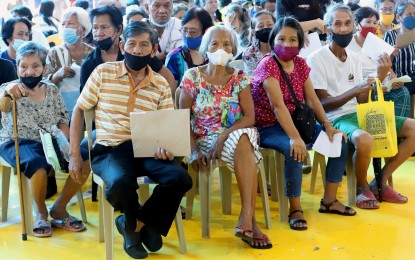
HEALTH INSURANCE. Senior citizens sit in line during the social pension distribution in Barangay Bahay Toro, Quezon City in this Dec 13, 2022 photo. Albay Rep. Joey Salceda said on Wednesday (April 3, 2024) he is exploring a more aggressive seniors health insurance system, particularly covering acute or catastrophic health care costs. (PNA file photo)
MANILA – The chairperson of the House Ways and Means Committee is eyeing a more aggressive seniors health insurance system, using around PHP40 billion in excess funds based on the Department of Health's (DOH) absorptive capacity as a potential financing source.
In a statement on Wednesday, Albay Rep. Joey Salceda said he is exploring a separate insurance fund for acute or catastrophic health care among the elderly.
"The unfilled gap is in acute or catastrophic health care. Without insurance, such medical expenses can be ruinous to ordinary families with senior citizens. The very limited case rates under PhilHealth’s (Philippine Health Insurance Corporation) existing packages simply won’t do," Salceda said.
He said the DOH unspent funds can be allocated to finance senior citizen healthcare in addition to PhilHealth's excess reserves.
"The risk profile is different so the fund also has to be different. The fiscal resources for health are not yet exhausted. The absorptive capacity of the DOH to spend it in full typically falls short. There’s usually around PHP40 billion in excess funds that can be used to support a more aggressive seniors health insurance system," he added.
Salceda said the primary issue in senior citizen welfare is how to address increasing needs for specialized services while balancing decreasing personal incomes due to retirement.
"That naturally produces a gap in personal capacity to finance not just healthcare, but even basic necessities and the little pleasures that come with dignified old age," he said.
Salceda said the average senior makes around PHP3,000 per month, which keeps around 47 percent of them below the poverty line.
"The welfare gap --or what we need to give all seniors a decent life– is around PHP9.1 trillion," he said.
Salceda further said around 18 percent of the welfare gap, or about PHP1.64 trillion, is the healthcare financing gap.
Within that healthcare financing gap, he said, PhilHealth already devotes its resources to primary and supportive healthcare, but the unfilled gap on catastrophic healthcare expenditure needs to be addressed.
"The problem of access to senior citizen healthcare is structural, but it should be addressed alongside other issues with senior citizen welfare," he added.
In March, the Departments of Trade and Industry, of Agriculture and of Energy signed a joint administrative order increasing the special discount for senior citizens and persons with disabilities (PWDs) on the purchase of basic necessities and prime commodities (BNPC) from PHP65 to PHP125 per week.
This translates to a new purchase cap of PHP2,500, compared to the previous limit of PHP1,300 per week. (PNA)
